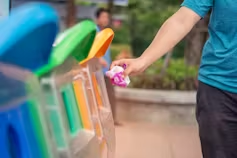Feed aggregator
Fisherman says great white shark jumping in his boat was 'just a mundane thing'
Terry Selwood was hurt when 2.7-metre shark, which weighed 200kg, leapt into his boat near Evans Head
A fisherman who watched a 2.7-metre great white shark land in his boat has downplayed the experience, calling it “just a mundane thing”.
Terry Selwood, 73, was caught by surprise while fishing off Evans Head, on the north coast of New South Wales, on Saturday afternoon when the shark launched itself into his 4.5-metre boat.
Continue reading...Coral bleaching on Great Barrier Reef worse than expected, surveys show
Surveys taken throughout 2016 show escalating impact from north to south, with 70% of shallow water corals dead north of Port Douglas
Coral bleaching on the Great Barrier Reef last year was even worse than expected, while the full impact of the most recent event is yet to be determined.
Queensland government officials say aerial and in-water surveys taken throughout 2016 had confirmed an escalating impact from north to south.
Continue reading...Horsing around in the north and Ziggy's a divine hypnotist
UK sets new solar power record of 24.3% of demand on May 26
Meet the latest organisation to join the Carbon Neutral Program
Meet the latest organisation to join the Carbon Neutral Program
Meet the latest organisation to join the Carbon Neutral Program
Meet the latest organisation to join the Carbon Neutral Program
Rescuing a river to save native fish
Loan refusal puts Adani mine at risk again
Could our old oil and gas infrastructure fuel a new jobs boom?
Distressing sight of a felled woodland: Country diary 50 years ago
Originally published on 29 May 1967
KESWICK: There is quite a lot of hardwood tree felling going on round here at present, not in State-owned woods but on private land. There are few sights more distressing to the senses (and sometimes the common sense) than a felled woodland, especially when most of the replanting (if any is done at all) will probably be of coniferous trees to replace these lovely oaks, beeches, and sycamores. I visited one such ravaged wood last night towards dusk in ignorance of its fate and found trees down, small fires burning, and a great quiet.
Related: Rebirth of a native woodland
Continue reading...Floods bring rush hour chaos to Bangkok
Thailand experiences the heaviest rainfall in a decade while in Russia, a prolonged dry spell results in devastating wildfires
The city of Bangkok has been inundated after a massive low pressure system encompassing North, Central and East Thailand produced heavy rainfall and widespread flooding last Thursday morning.
The district of Wang Thong Lang was hit the hardest with 169mm of rain, making it the heaviest rainfall event in the province over the last decade, while 90-130mm of rain fell across the city on average. Twenty three major roads, including Lat Phrao and Ratchada, were under more than 20cm of water, causing rush hour chaos.
Continue reading...Trump keeps world waiting on climate
Why you're almost certainly wasting time rinsing your recycling
 Your recycling doesn't have to be sparkling clean. Monticello/Shutterstock.com
Your recycling doesn't have to be sparkling clean. Monticello/Shutterstock.comOnce a fortnight we diligently wheel our recycling bin to the kerb, and then probably give ourselves a pat on the back while thinking of all the useful products we have helped to create, and the resources and energy we have saved.
Yet it pays to think a bit more deeply about what is going into each bin. Audits of kerbside collections have shown that around 10% (by volume) of the material placed in kerbside recycling bins shouldn’t be there. The most common “contamination” items include plastic bags (both full and empty), textiles, green waste, polystyrene (styrofoam) and general rubbish.
The problem cuts the other way too. Around a third of landfill waste bins routinely contain recyclables or green waste.
How many of us actually know where the contents of our recycling bin go, who manages it, and how the various materials are separated? This knowledge is a crucial element in reducing contamination and improving our recycling industry.
Bin informationA 2005 report found that 48% of Australians are confused about what can and cannot be recycled, not least because the rules and practices differ between local governments and commercial operators, and between households and workplaces.
For household recycling, we generally receive an annual flyer from the council telling us what should and shouldn’t go in the recycling bin. But there is typically little or no feedback on whether we’re getting it right.
By way of example, ask yourself (and your friends) how much time you spend rinsing out tins, yoghurt pots and other food containers before throwing them in the recycling.
The truth is that you don’t have to do this at all, because today’s recycling systems can easily cope with the levels of food often found in or on these containers. Yet many householders still do it, either because they were never told it was unnecessary, or because they were given the information but didn’t read it. Meanwhile, we waste water, energy and time rinsing our recycling.
Where’s the info?A recent confidential report compiled for four regional councils in Victoria found that only 29% of householders had ever looked at a council website for information about recycling. Most respondents said they got their information from schools, local newspapers and bin stickers.
It is important to have clear information from the right source about which items can and can’t be recycled. One example is plastic shopping bags, which many supermarkets urge their customers to recycle by placing them in dedicated bins on the shop premises. But this might prompt shoppers to think that plastic bags can be recycled in their kerbside collection too, which is typically not the case. And, as we saw above, relatively few householders check their local council’s website for the right information.
Plastic bags are just one of the common contaminants in the recycling stream that result in large volumes of recyclables being rejected and disposed of in landfill. This comes at a cost to the council, and therefore to us.
 Plastic shopping bags inevitably accumulate after a trip to the supermarket.
mtsofan/flickr, CC BY-NC-SA
Plastic shopping bags inevitably accumulate after a trip to the supermarket.
mtsofan/flickr, CC BY-NC-SA
 Some shopping centres will have bins for recycling plastic bags, but plastic bags typically belong in the rubbish.
chartphoto/flickr
Some shopping centres will have bins for recycling plastic bags, but plastic bags typically belong in the rubbish.
chartphoto/flickr
Many items can be recycled, given the right equipment. To persist with the plastic bag example, these require a machine that can separate them from the rest of the waste stream.
But this doesn’t work for full plastic bags, regardless of whether they contain rubbish or other recyclables. Full bags go straight to landfill because it is too laborious to empty them, and in some cases (such as when they contain nappies) doing so poses a health risk for workers at the recycling facility.
A little consumer knowledge goes a long way – both in improving the efficiency of our recycling systems and in increasing the motivation of householders who know they’re helping to make life easier for those who process their recycling.
Disposables vs reusablesWe must also have a good think, not just about the items we put in the recycling, but about which products we choose to use in the first place. Although we are bombarded with messages about reducing our use of disposable items, in some cases disposable is actually better.
 It’s better to rewash and reuse ceramics instead of using polystyrene cups… but only after 1,006 uses.
shadowfoot/flickr, CC BY-NC-SA
It’s better to rewash and reuse ceramics instead of using polystyrene cups… but only after 1,006 uses.
shadowfoot/flickr, CC BY-NC-SA
One study found that a ceramic cup would need to be used at least 39 times to be a better option than paper disposable cups, and 1,006 times when compared with a styrofoam one. A plastic reusable cup would need to be washed at least 17 times to be more sustainable than paper disposable ones, and 450 times when compared with styrofoam.
So if you’re prone to losing or breaking things (or just collecting too many reusable cups!), then it might be wise to consider going disposable (or being more careful).
Then comes the issue of whether and how these disposable cups can be recycled. Most outlets now use paper rather than styrofoam cups. While the plastic lid can be recycled, in most instances the cup cannot as there is a film of a plastic waterproof material inside it.
A good plan is to ask whether your favourite café stocks cups that can be recycled. If so, encourage them to put up a sign (if they haven’t already) indicating that they use fully recyclable cups, to avoid confusion.
The key to all of this is knowledge and balance – that is, after all, what sustainability is all about.
Trevor Thornton does not work for, consult, own shares in or receive funding from any company or organization that would benefit from this article, and has disclosed no relevant affiliations beyond the academic appointment above.
The world's most toxic town: the terrible legacy of Zambia's lead mines
Almost a century of lead mining and smelting has poisoned generations of children in the Copperbelt town of Kabwe in Zambia
“I’d like to be a doctor,” says seven-year-old Martin, sitting quietly in his modest home in Kabwe, Zambia. But the truth is that Martin struggles with his schoolwork, and his dream seems unlikely to become a reality.
Kabwe is the world’s most toxic town, according to pollution experts, where mass lead poisoning has almost certainly damaged the brains and other organs of generations of children – and where children continue to be poisoned every day.
Continue reading...Harambe: A year from gorilla death which sparked numerous memes
UK lobbies Europe to dilute flagship energy efficiency law
Green campaigners warn Conservative efforts to undermine energy targets will lead to weaker climate policies after Brexit
The UK is lobbying Europe to water down a key energy-saving target despite the fact it will not take effect until after Brexit, according to leaked documents that sparked warnings that energy bills could rise and jobs put at risk.
On the day Theresa May triggered article 50, government officials asked the European commission to weaken or drop elements of its flagship energy efficiency law.
Continue reading...Mottainai: a philosophy of waste
The eco guide to renewable energy
Solar power is soaring, wind goes from strength to strength. Look for a mighty surge in renewables over the next few years
One day in late March, during a sunny weekend, something spectacular happened. Solar power broke a new record. The demand for daytime electricity in UK homes fell to night times levels – thanks to solar panels in roofs and fields. Thanks to the sunshine, solar power created six times more electricity than coal-fired power stations that day.
One day in late March, solar power created six times more electricity than coal-fired power stations
Continue reading...


